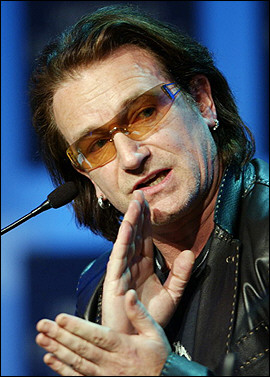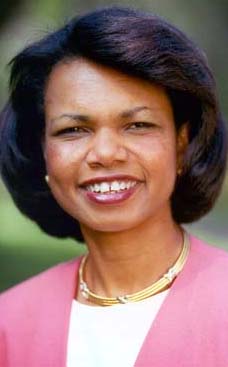
Yet he certainly has his critics. Paul Theroux, the author, believes him deluded for sending money to corrupt African governments. Having known him for 26 years, even I have doubts about what he is trying to achieve. I think he sees his cause with the eyes of love, and such lofty ambitions are mostly wishful thinking. “Our critics — I’ve met them in rock’n’roll in the early years and they’re the same people: cranks carping from the sidelines. A lot of them wouldn’t know what to do if they were on the field. They’re the party who will always be in opposition so they’ll never have to take responsibility for decisions because they know they’ll never be able to implement them. We get hits from the left, we get hits from the right, but in the end, every year, the world’s poor are better off for our presence.”
Bono responds to Critics
Michka Assayas meets Bono
I’m going back to my day job, honest
I first met Bono in 1980. I had come over from Paris to interview a score of new bands but nobody made an impression on me like he did. He was totally unreserved, unlike most of the British new wave, bouncing around, eyes darting, talking fast and full of energy. He was the first Irishman I ever met. Only later did I realise that his bonhomie was a national trait.
At that time U2 were sharing a tiny flat in Collingham Gardens in London that resembled the sort of spartan lodgings a cold war spy might have used. We crammed into the small kitchen, drank tea and talked politics, philosophy and music. We were young and pretentious, but even then Bono had a capacity to get the measure of a man in seconds. It’s a skill that has stood him in good stead.
*
With hindsight, was it inevitable that this skinny 20-year-old with his jeans and frizzy hair would go on to sell 130m records, campaign on African debt, gain the ear of presidents and prime ministers and even get nominated for the Nobel peace prize? Perhaps. Bono always thought big.
Although we met a few times over the years (I once tried to take him to Notre Dame but got lost), when I turned up in Dublin to interview Bono in 1997 we had not seen one another for more than a decade. The spartan lodgings were long gone; this time our rendezvous was at a lavish recording studio after which we adjourned to the pub. Superfame sat easy on his shoulders, perhaps because, as he says nowadays: “Celebrity is currency and I want to spend mine well.”
But something about Bono had changed. The expansive clown-like young man I had first met — born Paul David Hewson in Ballymun, Dublin, to a Protestant mother and a Catholic father — had become a little more hidden, more distant, taking greater care with his words. His stare was more focused and he scanned the room carefully. This caution, a kind of wariness, seemed to be the price of his fame. Later we decided to work on a book together (Bono on Bono, Hodder) a record of our conversations which happen every so often. This is my account of our most recent one which began with Bono singing a snatch of a John Lennon song.
I laughed at him. Didn’t he think it was a bit inappropriate to take Lennon’s part in Sgt Pepper on stage at Live 8 last year? “Oh, I don’t think like that,” he laughs right back. “I have the immodesty of foolishness. I was proud to stand in his shoes.”
Were you proud of everything that day? How about the lack of African artists on the bill? “There were a few of us worried about it,” he sighs. “Geldof gave up his life for a year working on this stuff. No sleep and a lot of grief. Some balls were going to be dropped. Most went in the back of the net. Personally, yes, I think it was a mistake not to have more African artists. There were a few of us worried about it. Bob was being protective of the ratings because the ratings, he felt, would in the end be the thing that protected Africa. I wasn’t so clear-cut, though. But it was Bob’s show . . . many African artists performed in Jo’burg that day. Most of the world cameras chose not to cover the concert there which maybe proves Bob’s point.”
I point out that the musician and local mayor Ali Farka Toure from Mali was just one African who said that he didn’t support Live 8 because he wasn’t interested in being used as a political pawn. Bono’s response? “If he doesn’t reckon Live 8 are helping his people, maybe they should rethink him being mayor.”
Last year was a colossal year for Bono, one in which he spent months away from his home near Dublin where he lives with Ali Hewson, his wife of 24 years, and their four children. For one thing, there was the 118-date world tour with U2, which 3m people saw and which earned the band $260m. Then for a couple of weeks the G8 summit propelled Africa and Bono’s crusade to the top of the geopolitical agenda.
Bono has been campaigning for Africa for the past 25 years. Last year, the Live 8 concerts that he organised with Bob Geldof and his lobbying of world leaders at the G8 summit in Gleneagles secured a $50 billion aid package. Despite sniping from some other aid agencies that it was too little, this money was the biggest success yet for Bono’s charity Data (Debt Aids Trade Africa), which he co-founded in 2002. Yet he certainly has his critics. Paul Theroux, the author, believes him deluded for sending money to corrupt African governments. Having known him for 26 years, even I have doubts about what he is trying to achieve. I think he sees his cause with the eyes of love, and such lofty ambitions are mostly wishful thinking. President Clinton was a huge fan, though. Does he get a frostier reception at Dubya’s White House?
Bono sniggers. “Well, look, I have had sour times over the Aids funding level back in 2003 when the cash was coming too slow. We had a bit of a row in the Oval Office, and even a few [months] ago we had another difference over funding for the Global Fund [the UN programme to fight Aids], but the Bush administration has funded the most extraordinarily successful Aids programme with nearly 400,000 Africans on ARVs anti-retroviral drugs].”
In the past few years Bono has won the support not only of two American presidents, but also of Vladimir Putin, Tony Blair, Kofi Annan and George Soros, the multi-millionaire. While most people’s (certainly most rock musicians’) ambitions might not include becoming the next Mother Teresa, Bono was always different, perhaps because faith has shaped his life. On the eve of U2’s world domination in 1983, he nearly quit the band over fears that the lifestyle was not compatible with his religion. Although he stayed a musician, from that point on it was obvious that music alone would never hold his entire focus.
So the fact that the Millennium Challenge Account, the US initiative for Africa which was created in early 2004 to direct funds and aid to the continent, has devoted only a fraction of what it promised must infuriate him. “I’m pissed. I’m mad, in fact, that not more has happened,” says Bono. “But still, more has happened than any could have imagined from them. Even though $400,000 is the figure [so far], over $2 billion has been set aside for Africa. We have had a heated debate about this, myself and the president. Funnily enough, he was almost as pissed off as I was.”
What did he say exactly? “He said there was no excuse. But it’s clear they had a lot on their mind. After 9/11 and entering into the war, some desks got very overcrowded. It’s not an excuse that I’m accepting but I do believe they will put it right. Even the most staunch critics of the administration’s aid development will concede that the president has tripled aid to Africa. Is it enough? No.”
Some might say that publicly denouncing the Bush administration would help his cause more than being pally with them. “I’ve been through this,” he says, exasperated. “We have had lots of rows and we have denounced the Bush administration when they have made mistakes, but we’re not placarding and throwing rotten tomatoes at people who are trebling aid to Africa.
“Our critics — I’ve met them in rock’n’roll in the early years and they’re the same people: cranks carping from the sidelines. A lot of them wouldn’t know what to do if they were on the field. They’re the party who will always be in opposition so they’ll never have to take responsibility for decisions because they know they’ll never be able to implement them. We get hits from the left, we get hits from the right, but in the end, every year, the world’s poor are better off for our presence.”
Despite the success of Gleneagles and progress in the fight against Aids and malaria, it still seems as if fair trade for Africa is not on any rich country’s agenda. On this issue he must surely concede failure?
*
“Look, we’ve made progress on debt and aid, and that must be celebrated,” he says quickly. “Trade will be an epic, long-term battle. France is one of the biggest problems in reaching a trade deal. People are worried that dismantling the common agricultural policy [CAP] in Europe would really affect small French farmers. We don’t think it should. The giant corporate farmers in America and Europe are receiving most of the subsidies. These subsidies are cruel to a farmer in the developing world who is trying to compete.”
Naturally, he remains positive though. At the moment the One Campaign, aiming to sign up Americans to fight the African Aids crisis and extreme poverty, gathers apace. “We’ve got others coming through now: Angelina Jolie, George Clooney, Brad Pitt. It’s the movement that will stop the tin-cupping [and] give us real political muscle. By 2008, the year of the next [American] election, I am assured that there will be 5m Americans, which makes us bigger than the National Rifle Association.”
He laughs, enjoying the thought. “Now, the NRA, if you mess with them, they go after you.”
Last year’s exertions have taken their toll. For my money, Bono sounds tired. His back has been giving him problems on tour, the consequence of a punishing schedule and age, too, perhaps. It was, he says, “a very difficult year, going into G8 and Live 8. There was very little sleep. There was a cost there.
“I’ll tell you this, I am parched for time to spend writing and time spent with the band. This year I really want to just lose myself more in the music and I will have to have a lower profile.”
That won’t be difficult.
© Michka Assayas 2006

















